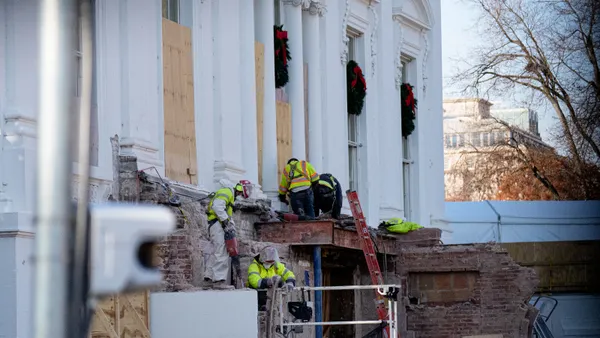Dive Brief:
- A Suffolk County Superior Court judge in Boston last week sentenced contractor Kevin Otto, owner of the now-defunct Atlantic Drain Services, to two years in jail in connection to the death of two workers who were killed in a trench collapse more than three years ago in October 2016, reported WBZ CBS Boston. Otto and Atlantic Drain were convicted of two counts of manslaughter on Oct. 31 at the end of an eight-day, jury-waived trial.
- Judge Mitchell Kaplan found that Otto and Atlantic Drain "knowingly and willfully" put the victims, Robert Higgins and Kelvin Mattocks, in extreme danger by not using required cave-in protection methods. Kaplan also said that Otto lied and gave false documentation — i.e. sign-in sheets for excavation and trenching training and workers' signed acknowledgment of receipt of personal safety equipment — to OSHA after the agency subpoenaed Atlantic Drain's records.
- Kaplan ordered Otto to serve his sentence for both counts of manslaughter concurrently, sentenced Otto to three years of probation and ruled that he can never employ anyone in a job that requires excavation. However, Kaplan allowed Otto to walk free while he is reviewing a motion to reconsider the case, which must be filed by Dec. 31.
Dive Insight:
Atlantic Drain employees Higgins and Mattocks were killed Oct. 21, 2016, after the trench in which they were working caved in. The two were buried up to the waist in dirt and were drowned within seconds after a fire hydrant supply line broke and filled the trench with water. Otto's defense team, according to WBZ, unsuccessfully tried to blame the city for not maintaining the hydrant correctly.
The trench collapse resulted in a massive OSHA fine of nearly $1.5 million and 18 safety violation citations. The agency said that Atlantic Drain had been cited for similar violations in 2007 and 2012. Among OSHA’s findings were that Atlantic Drain did not:
- Install support systems that would have protected employees from a cave-in and prevented the fire hydrant from collapsing;
- Remove employees from the hazardous conditions in the trench;
- Train workers in how to identify and deal with trench and excavation hazards; and
- Provide a ladder at all times so that employees could exit the trench.
OSHA issued the fine and citations in April 2017, but, according to the most recent OSHA records, Atlantic Drain contested them.
The collapse shined a light on the dangers of trenching and excavation work, driving the city of Boston to make big changes in how it issues construction permits. In December 2016, the Boston City Council passed a regulation that now allows the city to deny, revoke or suspend a building permit based on the contractor’s safety record. Contractors must now provide their OSHA safety record along with the application. The building department can also revoke or deny a permit if it finds out that the applicant has not been honest about its safety history.
Working in a trench or excavation without proper cave-in controls is so dangerous because of how heavy dirt is. Just one cubic yard can weigh up to 3,000 pounds.













